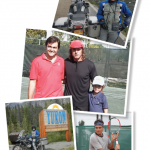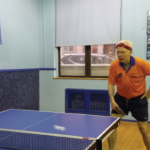‘I can scientifically prove that physical activity helps a wide variety of organs function well.’ —Sara Alehashemi, MD, MPH
Speed, Agility & Perseverance
Like tennis, badminton requires players to be responsive and quick on their feet. The difference between the two sports is that in badminton, the court is roughly one-quarter the size of a tennis court, the racquets are much lighter, and instead of balls, players hit shuttlecocks (also called shuttles or birdies), which are made from feathers embedded into a rounded cork base.
Perhaps the sport’s most difficult challenge is learning when to change your body speed. Dr. Alehashemi explains that smart opponents can figure out how you move, if you’re fast enough to hit the birdie from anywhere on the court and the degree of your eye-hand coordination.
“You can be a powerful player, smash the shuttle, but if your opponent hits the shuttle close to the net, you really need to have great foot movement,” she says.
While she was in medical school, Dr. Alehashemi’s team played in a national competition. Her most memorable athletic moment occurred in Tehran in 2004, on the third day of a national championship. It was winter, snowing and very cold. During the outdoor opening ceremony, the crowd was cheering, and Dr. Alehashemi and her team members were enjoying the moment. But by morning, she had developed a bad cold and fever.
“I really had to stick up for my team,” she recalls. “So I played my double match with my fever and another team member. Although we lost the championship, we won that game. I was pretty proud of that.”
Bigger World, Better Life
Over the years, Dr. Alehashemi says that badminton has taught her patience and persistence, which she applies in both her personal life and her job as a junior scientist.
“Whether I’m working, playing or training, I need to take things step by step and build on my abilities before moving naturally to the next step,” she says. “Otherwise, I’ll burn out, won’t be able to finish and risk injuring myself.”
Back in 2004, Dr. Alehashemi overworked a leg muscle while training and dislocated her right knee cap, which immediately swelled. Since then, that knee has been prone to similar injuries.
She believes that’s a small to price to pay for playing a sport that has added multiple dimensions to her life. Everywhere she has lived, she says badminton has helped her connect to the community and develop strong friendships with people representing all sorts of backgrounds, perspectives and lifestyles.
“Badminton helps me live better in my own world,” says Dr. Alehashemi.




